Overview
- Brief Narrative
- Cuticle cutters and pusher, a nail file, and manicure scissors in a fitted red leather case brought by 14-year-old Gisela Marx on a Kindertransport from Dulken, Germany, to Great Britain in August 1939. Her parents Erna and Leopold purchased the manicure set for her to take on her journey. The Nazi regime, in power since 1933, persecuted the Jewish population. Leopold, a former diplomat and WWI veteran, and Erna, a member of a wealthy, landowning family, thought their status would protect them, but in 1939, they decided to send Gisela to safety. The friend paid to care for her never showed up, and she was sent to live with an Orthodox rabbi, and then to boarding school. In 1941, Gisela had to perform military service and became a nurse. She worked in a children’s hospital in London. When it was bombed during the Blitz, she was transferred to an American military hospital in Surrey. The war ended when Germany surrendered on May 7, 1945. Gisela’s parents were deported and killed in the Riga Ghetto in December 1941.
- Date
-
use:
1939 August
- Geography
-
manufacture:
Austria
manufacture: Germany
manufacture: Italy
received: Dulken (Viersen, Germany)
- Credit Line
- United States Holocaust Memorial Museum Collection, Gift of The George Washington University and the Estate of John P. Eden
- Markings
- a. interior, back edge, gold ink : GROUND / LEATHER / Griffon / CASE MADE / IN AUSTRIA
c. front, handle, engraved : Special Triple Cut / GERMANY
d. back of triangular tool, engraved : GERMANY
e. top, on joint, engraved : Griffon
e. bottom, on joint, engraved : ITALY - Contributor
-
Subject:
Gisela A. Eden
Manufacturer: Griffon
- Biography
-
Gisela Amalie Marx was born on April 24, 1925, in Dulken, Germany, the nly daighter of a Jewish couple, Leopold and Erna Lifges Marx. Her father Leopold was born on November 28, 1882, in Dulken. Leopold had two sisters: Rosetta (Rosa) and Eva. He was in the German Army in World War I (1914-1918) and was awarded an Iron Cross. Gisela’s mother Erna was born on July 23, 1892, in Suchteln, Germany. Erna’s family was very wealthy and the largest landowners in Westphalia. Leopold and Erna met in Paris, where Leopold was a junior diplomat and Erna was a correspondent. Gisela’s family kept kosher and observed the holidays, but were not very religious.
In January 1933, Hitler came to power and, by summer, Germany was ruled by a Nazi dictatorship. Anti-Jewish policies were soon enacted. Leopold and Erna believed they had some protection because of their wealth and Leopold’s status as a veteran and diplomat. Still, they decided to send Gisela to England on a Kindertransport as the persecution worsened. Leopold sent money to a friend in England, who agreed to care for Gisela after she arrived. Gisela traveled from Cologne to Holland by train, then sailed to England, arriving on August 25, 1939. Her father’s friend never arrived to claim her. Gisela and two other abandoned children were sent to live with an Orthodox rabbi. Gisela had a very difficult time adjusting because she was not raised to be observant and did not speak English. A member of the Jewish Refugee Committee had Gisela sent to a boarding school in Lancashire. In 1941, Gisela was called for military service after she turned sixteen. She had to choose between the army, police, or nursing. Gisela chose to study nursing and worked at a children’s hospital in London. The hospital was bombed during the Blitz, the nightly German air raids on London from fall 1940 - May 1941. Gisela was transferred to an American military hospital in Surrey, where she cared for wounded American soldiers. The war ended when Germany surrendered on May 7, 1945.
Gisela’s family perished in the Holocaust. Her parents, Leopold and Erna, were deported from Dusseldorf to the Riga ghetto on December 11, 1941, where they died. Gisela’s paternal aunts Eva and Rosa were deported to Theresienstadt ghetto-labor camp, and were killed. Gisela worked at a nursery for disabled children, then received a grant to study Fine Arts at Cambridge. In 1950, Gisela received a Red Cross letter from a pastor in Dulken. Before Gisela’s parents were taken away, they had entrusted the pastor with their family jewelry and Judaica. They asked him to get the items to Gisela if they did not return. The pastor buried the items in his cellar. He was later arrested and interned in a concentration camp for preaching anti-Nazi sermons. Gisela and an American friend went to Dulken to retrieve her family belongings. She encountered anti-Semitism while she was there and was not able to recover her family’s assets. The pastor told her that Leopold and Erna believed that they were being sent to Theresienstadt. Upon her return to Cambridge, Gisela contacted an American friend who was related to the US ambassador in Italy. He helped Gisela get a visa to the US, despite the quota. On December 19, 1954, Gisela sailed from Liverpool, England, on the SS Ascania, arriving in New York on December 30. She settled in New York. She worked as a nurse, file clerk, and executive secretary. Gisela met John Peter Eden (1923-2013) at a British social club event. John was sent from Czechoslovakia on a Kindertransport to England in 1939. He emigrated to the US in 1950. The couple married in 1958 and settled in Washington DC. Gisela, age 87, passed away on August 20, 2012. John, age 85, died on May 29, 2013.
Physical Details
- Language
- English
- Classification
-
Personal Equipment and Supplies
- Object Type
-
Manicuring--Equipment and supplies (lcsh)
- Physical Description
- a. Red leather covered cardboard case with a straight back and a curved front with a gold colored metal zipper. On the interior, both sides have cardboard inserts covered with light brown fuzzy cloth, with leather lined sides. Leather bands secure the tools: on the lid is a band with 3 channels sewn to circular leather backing, with another band sewn to the back edge. The base interior has, near the front, a narrow band sewn to oval leather backing, next to a wide band; near the back is a narrow band. There are 6 bands to secure tools; this set has 4 tools so 1 or possibly 2 tools may have been lost.
b. Silver colored metal cuticle nippers with 2 curved handles with rounded exterior sides. One handle has an angled metal bar screwed on the interior. The handles extend into angled pointed blades with wide edges and angled sides with a sharp lower edge. The blades interlock at the center pivot point and are connected by a flat bolt.
c. Rectangular, flat, silver colored metal nail file with a rounded back edge, a semicircular cut out on the center bottom edge, and a pointed tip. In the center is a 2 inch wide textured file section with vertical grooves and shallow crisscrossed diagonal grooves.
d. Double sided cuticle pusher with a rectangular pearly white plastic handle with round ends in the center. Inserted in both ends is a silver colored metal cylindrical neck that tapers to a tool: on the left is a curved triangle with a pointed end; on the right is a curved rectangle with a round end.
e. Small silver colored metal manicure scissors with 2 looped handles that extend into curved wedge shaped blades with flat outer edges, sharp inner edges, and pointed tips. The 2 blades are screwed together at the center pivot point. - Dimensions
- a: Height: 3.500 inches (8.89 cm) | Width: 5.750 inches (14.605 cm) | Depth: 0.750 inches (1.905 cm)
b: Height: 4.000 inches (10.16 cm) | Width: 1.750 inches (4.445 cm) | Depth: 0.375 inches (0.953 cm)
c: Height: 4.000 inches (10.16 cm) | Width: 0.375 inches (0.953 cm)
d: Height: 5.000 inches (12.7 cm) | Width: 0.500 inches (1.27 cm) | Depth: 0.250 inches (0.635 cm)
e: Height: 3.625 inches (9.208 cm) | Width: 1.625 inches (4.128 cm) | Depth: 0.125 inches (0.318 cm) - Materials
- a : cardboard, leather, cloth, metal, thread, ink
b : metal
c : metal
d : metal, plastic
e : metal
Rights & Restrictions
- Conditions on Access
- No restrictions on access
- Conditions on Use
- No restrictions on use
Keywords & Subjects
- Topical Term
- Holocaust, Jewish (1939-1945)--Germany--Personal narratives. Jewish children in the Holocaust--Germany--Biography. Jewish refugees--Great Britain--Biography. Jews, German--England--Biography. Kindertransports (Rescue operations)--Great Britain--Personal narratives, German. Refugee children--England--Biography.
Administrative Notes
- Legal Status
- Permanent Collection
- Provenance
- The manicure set was donated to the United States Holocaust Memorial Museum in 2013 by The George Washington University, which received the item as a bequest from the Estate of John P. Eden.
- Funding Note
- The cataloging of this artifact has been supported by a grant from the Conference on Jewish Material Claims Against Germany.
- Record last modified:
- 2024-07-29 09:30:49
- This page:
- https://collections.ushmm.org/search/catalog/irn90827
Download & Licensing
In-Person Research
- By Appointment
- Request 21 Days in Advance of Visit
- Plan a Research Visit
- Request to See This Object
Contact Us
Also in John and Gisela Marx Eden collection
The collection consists of a manicure set, stuffed koala bear, suitcase, wristwatch, two scrolls, documents, and photographs relating to the experiences of Gisela Marx and her family before the Holocaust in Dulken, Germany and during the Holocaust in England, and two candlesticks, a lapel pin, and photographs relating to the experiences of Hans Eibuschitz (John Eden) and his family before the Holocaust in Czechoslovakia and during the Holocaust in England.
Date: 1855-1945
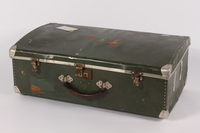
Green painted aluminum trunk used by Gisela Marx Eden
Object
Green aluminum trunk used by 14 year old Gisela Marx on a Kindertransport from Dulken, Germany, to Great Britain in August 1939. Gisela’s parents, Erna and Leopold, purchased the trunk for her trip, hoping it would be more waterproof. The Nazi regime, in power in Germany since 1933, persecuted the Jewish population. Leopold, a former diplomat and WWI veteran, and Erna, a member of a wealthy, landowning family, thought their status would protect them, but in 1939, they decided to send Gisela to safety. The friend paid to care for her never showed up, and she was sent to live with an Orthodox rabbi, and then to boarding school. In 1941, Gisela had to perform military service and she chose to become nurse. She worked in a children’s hospital in London. When it was bombed during the Blitz, she was transferred to an American military hospital in Surrey. The war ended when Germany surrendered on May 7, 1945. Gisela’s parents were deported and killed in the Riga Ghetto in December 1941.
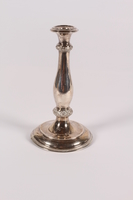
Silver floral embossed candlestick acquired by John Peter Eden
Object
Silver embossed candlestick, one of a pair, with 2013.476.4, owned by John Peter Eden (formerly Hans Eibuschitz), who escaped Czechoslovakia on a Kindertransport in 1939. The candlesticks were possibly brought to the United States before the war by John’s grandmother. After Germany invaded and annexed Czechoslovakia in March 1939, 12 year old Hans, and 9 year old brother Steven were sent to Great Britain on a Kindertransport. Hans was placed in private boarding schools. After graduation, he attended the London School of Economics to study actuarial science. In 1944 or 1945, he began training with the Royal Air Force. The war ended when Germany surrendered on May 7, 1945, before Hans entered active service.
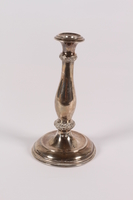
Silver floral embossed candlestick acquired by John Peter Eden
Object
Silver embossed candlestick, one of a pair, with 2013.476.3, owned by John Peter Eden (formerly Hans Eibuschitz), who escaped Czechoslovakia on a Kindertransport in 1939. The candlesticks were possibly brought to the United States before the war by John’s grandmother and given to him later. After Germany invaded and annexed Czechoslovakia in March 1939, 12 year old Hans, and 9 year old brother Steven were sent to Great Britain on a Kindertransport. Hans was placed in private boarding schools. After graduation, he attended the London School of Economics to study actuarial science. In 1944 or 1945, he began training with the Royal Air Force. The war ended when Germany surrendered on May 7, 1945, before Hans entered active service.
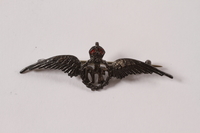
Royal Air Force sweetheart's wings pin acquired by John Eden
Object
Sterling silver Royal Air Force sweetheart's wings pin acquired by 17-year-old Hans Eibuschitz, a Jewish Czech refugee, while he was in training with the British Royal Air Force from about 1944 to 1945. A sweetheart pin was given to loved ones by soldiers, and were not issued by the RAF. After Germany invaded and annexed Czechoslovakia in March 1939, 12 year old Hans, and his 9 year old brother Steven were sent to Great Britain on a Kindertransport. Hans was placed in private boarding schools. After graduation, he attended the London School of Economics to study actuarial science. In 1944 or 1945, he began training with the Royal Air Force. The war ended when Germany surrendered on May 7, 1945, before Hans entered active service.
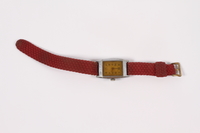
Wristwatch with red band and a red pouch taken by Gisela Marx Eden
Object
Wristwatch with a red band and a red cloth case brought by 14-year-old Gisela Marx on a Kindertransport from Dulken, Germany, to Great Britain in August 1939. Gisela’s parents, Erna and Leopold, purchased the watch for Gisela’s journey. The Nazi regime, in power since 1933, persecuted the Jewish population. Leopold, a former diplomat and WWI veteran, and Erna, a member of a wealthy, landowning family, thought their status would protect them, but in 1939, they decided to send Gisela to safety. The friend paid to care for her never showed up, and she was sent to live with an Orthodox rabbi, and then to boarding school. In 1941, Gisela had to perform military service and she became a nurse. She worked in a children’s hospital in London. When it was bombed during the Blitz, she was transferred to an American military hospital in Surrey. The war ended when Germany surrendered on May 7, 1945. Gisela’s parents were deported and killed in the Riga Ghetto in December 1941.
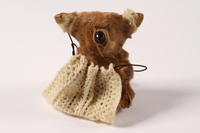
A stuffed koala bear, named Bear, carried by Gisela Marx Eden
Object
Stuffed koala bear, named Bear, with cover knitted by Gisela in 2001, carried by Gisela Marx, 14, on a Kindertransport from Dulken, Germany, to Great Britain in August 1939. The Nazi regime, in power since 1933, persecuted the Jewish population. Leopold, a former diplomat and WWI veteran, and Erna, a member of a wealthy, landowning family, thought their status would protect them, but in 1939, they decided to send Gisela to safety. The friend paid to care for her never showed up, and she was sent to live with an Orthodox rabbi, and then to boarding school. In 1941, Gisela had to perform military service and she became a nurse. She worked in a children’s hospital in London. When it was bombed during the Blitz, she was transferred to an American military hospital in Surrey. The war ended when Germany surrendered on May 7, 1945. Gisela’s parents were deported and killed in the Riga Ghetto in December 1941.
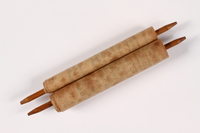
Parchment prayer scroll with cover buried and recovered postwar by Gisela Marx
Object
Miniature prayer scroll with a cardboard case returned to Gisela Marx when she went back to Dulken, Germany, after the war. Gisela, 14, was sent to safety by her parents Edna and Leopold who placed her on a Kindertransport to England in August 1939. Erna and Leopold gave some of their religious items, including this scroll and a scroll of daily prayers (2013.476.10), and other valuables, such as jewelry, to a pastor in Dulken, to preserve them. He buried the materials in his cellar. The paster was later arrested and sent to a concentration camp for preaching anti-Nazi sermons. With the help of the Red Cross, the pastor located and wrote to Gisela in 1950. When she came to visit, he returned the items to Gisela, fulfilling her parents' request. He told Gisela that her parents had believed they were being deported to Theresienstadt. Gisela later discovered that they had been sent from Dusseldorf on December 11, 1941, to the Riga ghetto where they perished.
Gisela Eden papers
Document
The Gisela Eden papers consists of correspondence, restitution paperwork, a poesie book, a diary, and family photographs relating to the experiences of Gisela Eden (née Marx) who traveled to England from Germany on a Kindertransport. The correspondence includes letters and postcards written by family and friends in Germany to Gisela Marx while she was living in England, 1939-1957. The letters, largely written by her parents, Leopold and Erna Marx, and relatives are written in German. The restitution paperwork is directed to Gisela Eden and relates to the Marx family. The paperwork includes correspondence, financial materials, notes, and a photocopy of Gisella Amalie Marx’s birth certificate, 1925. The photographs include photographs of the Eden family in Germany include Leopold and Erna Marx and their daughter, Gisela Marx, circa 1930s-1940s. The diary of Gisela Marx was written from March 29, 1939 to August 1941 in German and consists of 91 written pages. Gisela begins her diary while still living in Dülken, Germany and records her travels on the Kindertransport to England and her experiences while in England. Some of the entries include a newspaper clippings in English and small sketches. Gisela Marx’s poesie book, 1935-1942, includes autographs, notes, and drawings by her family and friends.
Miniature Megillat, Book of Esther, scroll with illustrations returned to Gisela Marx Eden
Object
Commercially published miniature version of a Megillat, or Book of Esther, scroll with illustrations returned to Gisela Marx when she went back to Dülken, Germany, after the war. Gisela was sent to safety by her parents Edna and Leopold who placed her on a Kindertransport to England in August 1939. Erna and Leopold gave some of their religious items, including this scroll and a scroll of daily prayers (2013.476.10), and other valuables, such as jewelry, to a pastor in Dülken, to preserve them. He buried the materials in his cellar. The paster was later arrested and sent to a concentration camp for preaching anti-Nazi sermons. With the help of the Red Cross, the pastor located and wrote to Gisela in 1950. When she came to visit, he returned the items to Gisela, fulfilling her parents' request. He told Gisela that her parents had believed they were being deported to Theresienstadt. Gisela later discovered that they had been sent from Dusseldorf on December 11, 1941, to the Riga ghetto where they perished.



